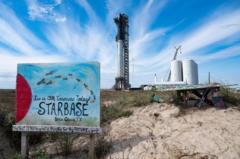The southern tip of Texas has witnessed a remarkable transformation as Elon Musk's SpaceX facility has officially become the city of Starbase. In a recent election, residents overwhelmingly voted in favor of incorporating this area into a municipality, with 212 votes supporting the move and only six opposing it among the 283 eligible voters, predominantly consisting of SpaceX employees. Musk celebrated the news on his social media platform X, exclaiming, "Starbase, Texas is now a real city!"
Covering approximately 1.6 square miles, this area was largely uninhabited before SpaceX's expansion began in 2012. The newly-formed city's governance will consist of a mayor and two commissioners, essentially allowing them to oversee local planning and taxation. However, some nearby residents are raising environmental concerns, arguing that SpaceX's presence has negatively affected the local ecosystem.
As SpaceX's operations expanded, so did housing developments, resulting in an estimated nearby population of 500 individuals. The potential for city incorporation had been speculated for years before it became a reality after a petition was submitted in December 2023, leading to last Saturday's vote.
Starbase will function as a Type C city, which allows for a property tax rate of up to 1.5%. A bill currently under consideration in the Texas state legislature could also provide Starbase officials with the authority to manage road closures and access to Boca Chica Beach during rocket launches, which might cause conflicts with existing county governance. Cameron County officials, including Judge Eddie Trevino Jr., have openly opposed the proposed bill, emphasizing competing interests between Starbase and county operations.
While SpaceX regularly conducts rocket launches from its Starbase site, environmental advocates have voiced concerns over light pollution and the threat to local wildlife, particularly in the wake of a significant fine in 2024 for wastewater dumping. Despite these controversies, SpaceX claims compliance with environmental regulations and has characterized the fines as disputes over procedural matters.
In a broader context, Elon Musk's shift of many corporate operations from California to Texas aligns with his critique of the state's political landscape, seeking a more favorable environment for business. As Starbase evolves, the implications of its designation as a city could define the future of SpaceX's operations and community relations in the region.
Covering approximately 1.6 square miles, this area was largely uninhabited before SpaceX's expansion began in 2012. The newly-formed city's governance will consist of a mayor and two commissioners, essentially allowing them to oversee local planning and taxation. However, some nearby residents are raising environmental concerns, arguing that SpaceX's presence has negatively affected the local ecosystem.
As SpaceX's operations expanded, so did housing developments, resulting in an estimated nearby population of 500 individuals. The potential for city incorporation had been speculated for years before it became a reality after a petition was submitted in December 2023, leading to last Saturday's vote.
Starbase will function as a Type C city, which allows for a property tax rate of up to 1.5%. A bill currently under consideration in the Texas state legislature could also provide Starbase officials with the authority to manage road closures and access to Boca Chica Beach during rocket launches, which might cause conflicts with existing county governance. Cameron County officials, including Judge Eddie Trevino Jr., have openly opposed the proposed bill, emphasizing competing interests between Starbase and county operations.
While SpaceX regularly conducts rocket launches from its Starbase site, environmental advocates have voiced concerns over light pollution and the threat to local wildlife, particularly in the wake of a significant fine in 2024 for wastewater dumping. Despite these controversies, SpaceX claims compliance with environmental regulations and has characterized the fines as disputes over procedural matters.
In a broader context, Elon Musk's shift of many corporate operations from California to Texas aligns with his critique of the state's political landscape, seeking a more favorable environment for business. As Starbase evolves, the implications of its designation as a city could define the future of SpaceX's operations and community relations in the region.




















